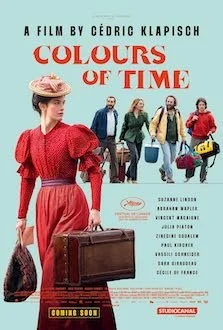Direction: Cédric Klapisch
Country: France / Belgium
Colours of Time is an absolutely delightful and mesmerizing impressionistic tale, packed with history and an invigorating sense of adventure and discovery. Co-writer and director Cédric Klapisch (The Spanish Apartment, 2002; Rise, 2022) knows how to draw out charm through a compelling narrative structure, well-chosen environments, and bright, luminous visuals.
In this period drama, four distant cousins—young digital creator Seb (Abraham Wapler), soon-to-retire teacher Abdel (Zinedine Soualem), workaholic businesswoman Céline (Julia Piaton), and easygoing beekeeper Guy (Vincent Macaigne)—hit it off surprisingly well after meeting for the first time in Paris, summoned by a governmental agency interested in purchasing the house of an ancestor, Adèle Meunier (Suzanne Lindon). Alternating between past and present, with Paris as the central axis, the film also follows Adèle’s inspiring 19th-century journey as she leaves Normandy in search of her mother (Sara Giraudeau).
Impeccable production design and period detail make the film beautiful as a painting, and the smooth transitions between eras are particularly notable. Driven by a love of art and by Lindon’s charming performance, Colours of Time unfolds gently—subtly mixing humor and emotion in satisfying doses and using feel-good ingredients to explore what binds people together in a warm, perceptive portrayal of human relationships.
The script, which could easily sit alongside Alain Resnais’ lighter works, earns its own originality through its endearing characters and narrative fluidity. It marks an ambitious return for Klapisch, who invites us to look at life with renewed tenderness and understanding. This is truly great cinema, reminding us of the enduring impact of ancestry on our lives.










